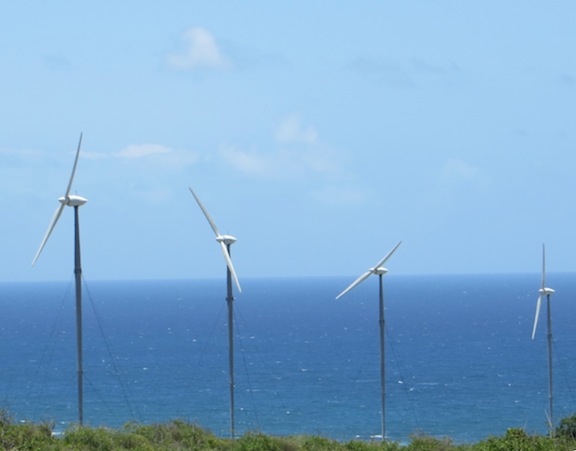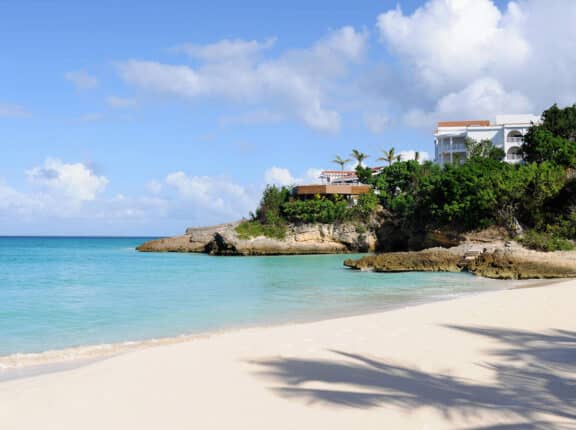Above: a wind farm in Nevis (CJ Photo)
By Michael W Edghill
CJ Contributor
NO, THE FOCUS of the following is not going to be on the impending doom of global climate change and the peril that island nations will face due to rising sea levels and warming ocean currents.
While a discussion of the merits of the climate change argument may be worthy of engaging in and the consequences of its possible effects may be devastating, that conversation alone has not been enough to motivate many to see the need to invest in renewable energy sources throughout the Caribbean.
Governments throughout the region have been saying the right things regarding concerns over climate change and have been demonstrating a willingness to commit in principle to increasing the use of renewable energy. This includes the March 2013 approval by CARICOM ministers of a target for member-states to produce 47 percent of their electricity needs through renewables by the year 2027.
However, there still appears to be a lack of mass political and capital investment.
Perhaps this is due to the fact that the climate change arguments for investment in renewable energy sources are based in the far-off, theoretical, hard-to-imagine world of scientific hypotheses, data collection, and analysis.
Not as difficult to grasp is the need for Caribbean states to invest in renewable energy in order to reduce reliance on energy imports and to free these nations from the volatility of the oil market.
The cost of importing the vast majority of energy needed for all forms of transportation and production drives up the prices of all goods and services produced in the Caribbean.
Zia Mian, formerly of the World Bank, wrote as much in a special column for the Jamaica Gleaner in October of this year: “The cost of petroleum fuels, as well as electricity in these countries, is high, making it difficult for them to compete in the regional or international markets.”
Of the many interesting things that Mian contributed in this piece, one that jumped out was his assertion that liberating Caribbean states from such reliance on imported fuels was a key to furthering development in the region.
“For the energy deficient countries of the region, the immediate and long-term sustainability of development depends on facilitating the advancement of enabling environments that would allow increased domestic productive capacity and production of goods and services at competitive and affordable costs,” Mian wrote.
A key to regional development in recent history, despite skyrocketing petroleum fuel costs, has been the largesse of Venezuela through its PetroCaribe initiative.
By keeping participating Caribbean states insulated from the dramatic increase in fuel costs by way of subsidization and delayed-payments, PetroCaribe has allowed the Caribbean to continue to invest in a number of projects that have stimulated economic growth while much of the rest of the western world has been mired in full-scale recession.
The future of PetroCaribe is now, however, very much in doubt. In July of this year, I wrote of the grave concerns all should have who have come to rely on this Venezuelan programme.
Others more reputable than I, including Marla Dukharan, Group Economist for RBC Caribbean, share the similar view that PetroCaribe cannot be relied upon long-term.
In a presentation from May of 2013 made to the 5th Biennial International Business, Banking, and Finance Conference at UWI-St Augustine, Dukharan argued that since Venezuela incurs a loss through its PetroCaribe agreements, it is unsustainable in its current form.
Making matters worse is that mismanagement of the Venezuelan economy and oil sector has led the Venezuelan government to, quite literally, mortgage their petroleum reserves to China in exchange for more friendly loans from the China Development Bank.
More to the point, in order to attempt to save the Venezuelan economy, PetroCaribe partners will see subsidies reduced and payment conditions altered so that Venezuela can meet its obligations to China, whom it has come to rely upon.
The eventual failure of PetroCaribe will re-expose small Caribbean states to relying upon highly-volatile and increasingly costly fuel imports to provide their energy needs.
If global conditions maintain their current trends, this undesirable scenario will play itself out within a matter of years, not decades.
Therefore, the need to invest in renewable energy solutions in the Caribbean is now a pressing one based upon practical economic conditions of the near term rather than scientific analysis of conditions that are relatively far off.
For the needed investment in renewable energy to pay off, it must be a thorough and well-planned investment though, not just pie-in-the sky idealism, but practical solutions that are workable and sustainable. Matthew Fellmeth, an analyst with the energy consulting firm Reznick Think Energy, laid out three hurdles that must be overcome for the Caribbean to effectively harness renewable energy for the future.
One of these hurdles is that the current electricity grid in the Caribbean is outdated and inefficient. Wide investment in renewable energy in any capacity would prove wasteful if the energy produced cannot be efficiently transferred to consumers.
This is where governments must look pragmatically at the realities of investing in renewable energy for the future and making a holistic plan for how to move the Caribbean towards wider use of renewable energy in a cohesive and useable way as opposed to a piecemeal, project-by-project approach.
Big initiatives of this type require big vision, long-term planning, and methodical implementation. As the need for renewable energy as a means of encouraging economic and societal growth becomes more obvious, the only question that will remain to be answered is whether or not Caribbean leaders can build support for projects of this scale and follow these projects through to completion.
Projects that will help these nations to take some control over their energy future. Or will the dynamics of politics played as a zero-sum game prohibit real progress to be made towards workable its energy projects and leave the Caribbean, once again, to the mercy of global forces beyond their control?
Michael W Edghill, a Caribbean Journal contributor, teaches courses in US Government & in Latin America & the Caribbean. His work has also appeared in the Yale Journal of International Affairs and Americas Quarterly.







